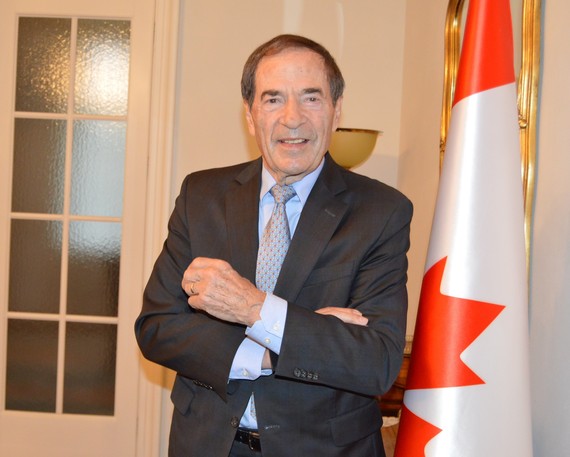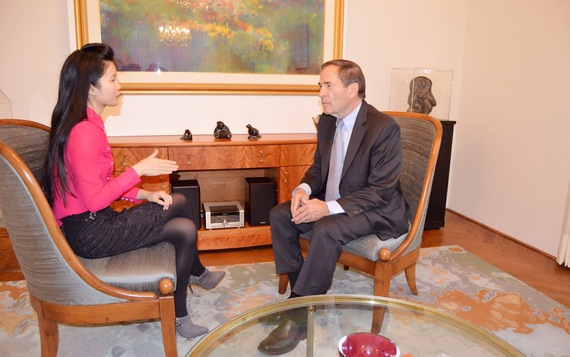Otto Jelinek is currently Canadian Ambassador to the Czech Republic. As a former refugee from Communism, he has a high-level track record. Jelinek was a world championship figure skater, winning the 1962 pairs title with his sister Maria. After becoming a world figure skating champion, Jelinek was also successful in his next venture as a skating goods manufacturer. That was followed by a political career with the Progressive Conservative Party of Canada that included a sequence of ministerial positions concerned with amateur sport, supply and services, and national revenue.
Jelinek left politics in 1993 and moved to the Czech Republic and became chairman of Deloitte Central Europe, among other positions. Lan Anh Vu found some time in his busy schedule to talk to him about his professional journey, the challenges he faced and his advice for young people.
As told to Lan Anh Vu
My Career in Sports, Business, Politics and DiplomacyMy sister and I never thought when we skated that one day we could be the world champions. We had the determination to do our best and work towards being the best in whatever we did. We went from competitive skating to professional skating, performing in a professional live show. This led to the opportunity to make some money in professional skating. I used that money to invest in business and manufactured figure and hockey skates.
As I was running my business, and because Canadians recognized my name quite well from my role in the World Championships, I often spoke at local Rotary clubs, Lions Clubs and organizations of that nature. When I gave talks, I sometimes complained about how small- and medium-sized business owners like myself faced a lot of red tape thrown at us by all levels of government and political parties. So I was then singled out as someone who could express that point of view on the floor of the House of Commons. I served twenty-one years in the Canadian parliament. I never planned to go into politics.
After I left politics, I held the Chairmanship of Deloitte Central Europe, and spent almost two decades in the Czech Republic before returning to Canada in 2012. And in 2013, I was appointed as ambassador of Canada to the Czech Republic.
My life had little to do my planning it; it unfolded this way because of the circumstances I found myself in, and I took advantage of them. I then did the best I possibly could. Sometimes, whether it's sports or business, politics or diplomacy, the conditions are the same: you must be driven, and have self-discipline and commitment. If you want something bad enough, you can always get it. If you really commit yourself to something, and if you are in the right situation, then one can succeed.
ChallengesThere were many times I wanted to give up. For instance, in sports, when my sister and I had to wake up at 4am to go practice in the middle of winter. We skated every morning from 5am-7am, then we had school from 8am through most of the day, and then we skated again at night. You feel like giving up. Or when you skate in the championship, and you think you should come second or third and then you came in fourth. You are so close to the medal that you will want to give up. But then, you don't want to give up because you came in fourth, and you want to go again to make sure you come in first next time. With all the successes, whether in business or politics or sports, there are always failures and, with the failures, you become a stronger person.
What I Have LearnedI have learned not to give up. If you push down, you have to keep getting up and start over again. If you don't keep doing it, you will never learn. It's persistence. I think my key asset is self-discipline and persistence. I am not a really smart guy; I am a persistent guy. There are many smarter guys in the world than I am.
In politics, I ran in six federal elections, and I won all six consecutive federal elections in a row. When I became a Cabinet Minister, the biggest problem I had was not with the opposition in the Parliament, not with the voting public, not with the media, but with my bureaucracy. And that was frustrating part of my life until I was able to work with bureaucracy in such a way that we worked together and we were able to succeed together. You've got a tapping a lot by mistakes. Working together is better than working against each other. In life, you don't try to break a lot of jams by yourself, but work together.
My Perspective on LifeI look at life as a journey with a lot of challenges in between to be accomplished. I don't consider it a mission. I started realizing that it is a one-way journey, and it is not necessarily a mission, but you try to fulfill your life with challenges that are available for you. And one has to pick the right challenges, because there is no use my picking a challenge in which I don't have an advantage.
My Definition of SuccessI define success as achieving the challenges that I put in front of myself. I want to be the best in what I do and I want to make the right choices. I certainly don't measure success by money. For instance, in sports the best way to generate happiness and good things for people that you are working with is to provide opportunities for others, to help them with their problems, or to make people happy, as when my sister and I skated professionally every night. We did that for six years. The feeling that I made ten thousands of people happy every night made me very happy going to sleep. I would then wake up in the morning and say: "Today, I will have another chance to make tens of thousands of people happy''. That's a real measurement of success.
What I Believe Makes a Strong LeaderLeaders must be able to listen, not be too quick to judge, and not be too quick to get stuck in conflict. Leaders must be able to compromise enough to stick to their principles and be willing to tackle challenges put in front of them. A leader must work with others and try to bring solutions to problems. Very often, leaders have their own agenda and they don't look beyond it. Today the world has become very small, and people cannot have their own agenda without attacking others' agenda. Leaders must respect other people's views and strive to find compromises. Words for leaders have to be matched with actions. People that don't follow up with actions and specific solutions are no leaders.
My Advice to Young PeopleI would advise young people not to follow in my footsteps, because there are new ways for young people and better ways than mine to achieve their goals. The world has changed now and so therefore following in anyone footsteps is not the right solution. Footprints have changed dramatically, and everything people learn has changed dramatically. Maybe having multiple careers was the right thing for me, but that doesn't mean it's the right thing for young people to have four or five careers. There's a negative side to having many careers. Changing careers for young people, unless it makes sense, one follows the other in a way that you learn from the previous one, or otherwise don't do it. However, you can always learn from yourself. The mistakes I made--whether in politics, sports or business--I learned from them. I made many mistakes. You learn from mistakes and I hope one become a better human being from them. Learn from mistakes and you can improve yourself as a whole.
This interview has been condensed and edited for clarity.
This post is part of "How I Got There" series, which features people around the world speaking on their journey. What is the path to success? What challenges did people face and how did they overcome them? Lan Anh and her guests answer all these questions and much more. To view the entire series, visit here.


